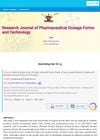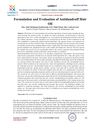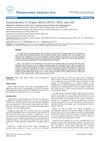 November 2023 in “Research Journal of Pharmaceutical Dosage Forms and Technology”
November 2023 in “Research Journal of Pharmaceutical Dosage Forms and Technology” The herbal hair oil significantly promotes hair growth.
 July 2023 in “Journal of Indian System of Medicine”
July 2023 in “Journal of Indian System of Medicine” Ayurveda can help treat premature hair graying with lifestyle changes and herbal remedies.
 March 2021 in “Egyptian Journal of Chemistry”
March 2021 in “Egyptian Journal of Chemistry” The herbal shampoo with Momordica charantia and Hibiscus Rosa-Sinensis is safe and promotes hair growth and scalp health.
 September 2020 in “Journal of the turkish academy of dermatology”
September 2020 in “Journal of the turkish academy of dermatology” Some dermatology patients in Turkey use traditional medicine, with herbal remedies being most common, but these treatments can have mixed results and risks.
August 2020 in “Journal of Womens Health, Issues and Care” PCOS affects many women, causing menstrual issues and infertility, but can be managed with lifestyle changes, medications, and possibly herbal treatments.
 July 2019 in “Journal of Cosmetic Dermatology”
July 2019 in “Journal of Cosmetic Dermatology” The July 2019 journal had articles on rosacea treatment and herbal hair loss remedies.
 January 2018 in “Clinical dermatology open access journal”
January 2018 in “Clinical dermatology open access journal” The Biofield Energy Treated herbal mixture increased hair growth in mice compared to the untreated mixture.
The S-2 herbal extract significantly promotes hair growth.
 23 citations,
July 2018 in “BMC Complementary and Alternative Medicine”
23 citations,
July 2018 in “BMC Complementary and Alternative Medicine” Certain herbal combinations in traditional Chinese medicine might be effective for treating hair loss, focusing on liver or stomach health.
 16 citations,
January 2012 in “Asian pacific Journal of Tropical Biomedicine”
16 citations,
January 2012 in “Asian pacific Journal of Tropical Biomedicine” The herbal cream was found to be a safe and effective alternative for hair growth, similar to minoxidil.
 2 citations,
July 2009 in “Pharmacognosy Research”
2 citations,
July 2009 in “Pharmacognosy Research” A herbal mix with chickpea, holy basil, and nut grass extracts grew rat hair well, similar to a common hair growth drug.
 1 citations,
January 2017 in “The Journal of Korean Medicine Ophthalmology and Otolaryngology and Dermatology”
1 citations,
January 2017 in “The Journal of Korean Medicine Ophthalmology and Otolaryngology and Dermatology” Combining finasteride with a Korean herbal medicine called Gagamcheongyoung-tang can improve hair loss symptoms.
 January 2025 in “International Journal of Advanced Research in Science Communication and Technology”
January 2025 in “International Journal of Advanced Research in Science Communication and Technology” The herbal hair oil effectively promotes hair growth, reduces dandruff, and is safe for all hair types.
 February 2024 in “Bangladesh pharmaceutical journal”
February 2024 in “Bangladesh pharmaceutical journal” The herbal hair oil increased hair growth and reduced hair fall for most users without significant side effects.
January 2018 in “대한본초학회지(본초분과학회지)” The herbal extract SHJ promotes hair growth and increases melanin production.
The herbal mix effectively treats PCOS and can be sold for this use.
The herbal extract CS-10-H significantly promotes hair growth in mice.
January 2010 in “대한미용학회지” The herbal extracts effectively promoted hair growth.

Korean herbal extracts may promote hair growth.
 3 citations,
January 2011 in “Journal of biologically active products from nature”
3 citations,
January 2011 in “Journal of biologically active products from nature” The F1 herbal mixture grew hair well and could treat hair loss without the side effects of common treatments.
 July 2022 in “International journal of Ayurvedic medicine”
July 2022 in “International journal of Ayurvedic medicine” The new herbal shampoo effectively controls dandruff using natural ingredients.
 March 2022 in “International journal of biology, pharmacy and allied sciences”
March 2022 in “International journal of biology, pharmacy and allied sciences” Ayurvedic treatment with local herbal applications successfully regrew hair in a patient with alopecia areata.
Acupuncture and herbal treatments effectively reduced hair loss in androgenetic alopecia.
 January 2014 in “韓方眼耳鼻咽喉皮膚科學會誌 = The journal of Korean Medicine Ophthalmology & Otolaryngology & Dermatology”
January 2014 in “韓方眼耳鼻咽喉皮膚科學會誌 = The journal of Korean Medicine Ophthalmology & Otolaryngology & Dermatology” Thread embedding and herbal acupuncture improved a case of female pattern hair loss.
 June 2023 in “International journal of research in ayurveda and pharmacy”
June 2023 in “International journal of research in ayurveda and pharmacy” Dhatryadi Rasayana, an Ayurvedic herbal mix, may be a safe and effective way to prevent premature hair greying.
 June 2022 in “Asian Pacific journal of health sciences”
June 2022 in “Asian Pacific journal of health sciences” Ayurvedic treatments like bloodletting, herbal packs, and medicated liquid flow over the head are a safe and effective alternative for hair loss.

Yonnyuniksoogobon-dan, an herbal mix, was found to promote hair growth in mice.
11 citations,
August 2012 in “BMJ case reports” Ban Tu Wan, a Chinese herbal supplement, can cause severe liver damage.
 January 2020 in “Acta Scientiae Veterinariae”
January 2020 in “Acta Scientiae Veterinariae” A dog's chronic bite wound healed successfully using a mix of herbal gel, low power laser, and ozone therapy.
 1 citations,
January 2017 in “Pharmaceutica Analytica Acta”
1 citations,
January 2017 in “Pharmaceutica Analytica Acta” The research confirmed that certain methods are reliable for standardizing Eclipta alba and ensuring its safety and quality in herbal products.






















